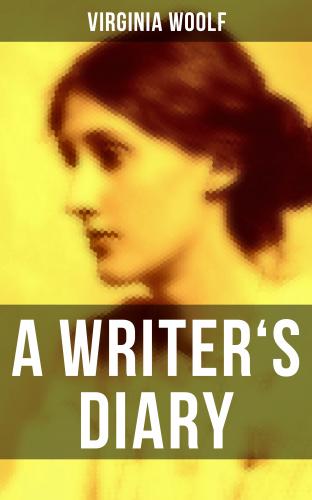Virginia Woolf: A Writer's Diary. Вирджиния Вулф
tion>
Virginia Woolf
Virginia Woolf: A Writer's Diary
Events Recorded from 1918-1941
Published by
Books
- Advanced Digital Solutions & High-Quality eBook Formatting -
2017 OK Publishing
ISBN 978-80-272-3607-7
Table of Contents
1918.
Monday, August 5th.
While waiting to buy a book in which to record my impressions first of Christina Rossetti, then of Byron, I had better write them here. For one thing I have hardly any money left, having bought Leconte de Lisle in great quantities. Christina has the great distinction of being a born poet, as she seems to have known very well herself. But if I were bringing a case against God she is one of the first witnesses I should call. It is melancholy reading. First she starved herself of love, which I meant also life; then of poetry in deference to what she thought her religion demanded. There were two good suitors. The first indeed had his peculiarities. He had a conscience. She could only marry a particular shade of Christian. He could only stay that shade for a few months at a time. Finally he developed Roman Catholicism and was lost. Worse still was the case of Mr Collins—a really delightful scholar—an unworldly recluse—a single-minded worshipper of Christina, who could never be brought into the fold at all. On this account she could visit him affectionately in his lodgings, which she did to the end of her life. Poetry was castrated too. She would set herself to do the psalms into verse; and to make all her poetry subservient to the Christian doctrines. Consequently, as I think, If she starved into austere emaciation a very fine original gift, which only wanted licence to take to itself a far finer form than, shall we say, Mrs Browning’s. She wrote very easily; in a spontaneous childlike kind of way one imagines, as is the case generally with a true gift; still undeveloped. She has the natural singing power. She thinks too. She has fancy. She could, one is profane enough to guess, have been ribald and witty. And, as a reward for all her sacrifices, she died in terror, uncertain of salvation. I confess though that I have only turned her poetry over, making my way inevitably to the ones I knew already.
Wednesday, August 7th.
Asheham diary drains off my meticulous observations of flowers, clouds, beetles and the price of eggs; and, being alone, there is no other event to record. Our tragedy has been the squashing of a caterpillar; our excitement the return of the servants from Lewes last night, laden with all L.’s war books and the English review for me, with Brailsford upon a League of Nations, and Katherine Mansfield on Bliss. I threw down Bliss with the exclamation, ‘She’s done for!’ Indeed I don’t see how much faith in her as woman or writer can survive that sort of story. I shall have to accept the fact, I’m afraid, that her mind is a very thin soil, laid an inch or two deep upon very barren rock. For Bliss is long enough to give her a chance of going deeper. Instead she is content with superficial smartness; and the whole conception is poor, cheap, not the vision, however imperfect, of an interesting mind. She writes badly too. And the effect was as I say, to give me an impression of her callousness and hardness as a human being. I shall read it again; but I don’t suppose I shall change. She’ll go on doing this sort of thing, perfectly to her and Murry’s satisfaction. I’m relieved now that they didn’t come. Or is it absurd to read all this criticism of her personally into a story?
Anyhow I was very glad to go on with my Byron. He has at least the male virtues. In fact, I’m amused to find how easily I can imagine the effect he had upon women—especially upon rather stupid or uneducated women, unable to stand up to him. So many, too, would wish to reclaim him. Ever since I was a child (as Gertler would say, as if it proved him a particularly remarkable person) I’ve had the habit of getting full of some biography and wanting to build up my imaginary figure of the person with every scrap of news I could find about him. During the passion, the name of Cowper or Byron or whoever it might be, seemed to start up in the most unlikely pages. And then, suddenly, the figure becomes distant and merely one of the usual dead. I’m much impressed by the extreme badness of B.’s poetry—such of it as Moore quotes with almost speechless admiration. Why did they think this Album stuff the finest fire of poetry? It reads hardly better than L.E.L. or Ella Wheeler Wilcox. And they dissuaded him from doing what he knew he could do, which was to write satire. He came home from the East with satires (parodies of Horace) in his bag and Childe Harold. He was persuaded that Childe Harold was the best poem ever written. But he never as a young
